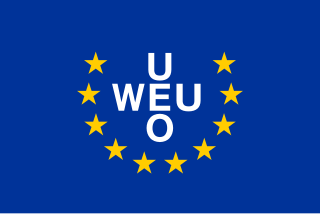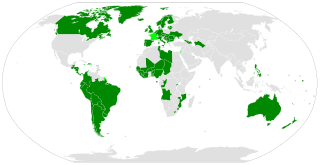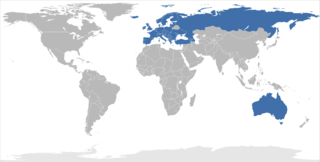Related Research Articles

The Council of Europe is an international organisation established in the wake of World War II to uphold human rights, democracy and the rule of law in Europe. Founded in 1949, as of 2023 it brings together 46 member states, with a population of approximately 675 million; it operates with an annual budget of approximately 500 million euros.

The European Convention on Human Rights is an international convention to protect human rights and political freedoms in Europe. Drafted in 1950 by the then newly formed Council of Europe, the convention entered into force on 3 September 1953. All Council of Europe member states are party to the convention and new members are expected to ratify the convention at the earliest opportunity.

The Western European Union was the international organisation and military alliance that succeeded the Western Union (WU) after the 1954 amendment of the 1948 Treaty of Brussels. The WEU implemented the Modified Brussels Treaty. During the Cold War, the Western Bloc included the WEU member-states, plus the United States and Canada, as part of the North Atlantic Treaty Organization (NATO).

In an extradition, one jurisdiction delivers a person accused or convicted of committing a crime in another jurisdiction, over to the other's law enforcement. It is a cooperative law enforcement procedure between the two jurisdictions and depends on the arrangements made between them. In addition to legal aspects of the process, extradition also involves the physical transfer of custody of the person being extradited to the legal authority of the requesting jurisdiction.
The Protocol to Prevent, Suppress and Punish Trafficking in Persons, Especially Women and Children is a protocol to the United Nations Convention Against Transnational Organized Crime. It is one of the three Palermo protocols, the others being the Protocol Against the Smuggling of Migrants by Land, Sea and Air and the Protocol Against the Illicit Manufacturing of and Trafficking in Firearms.
The European Arrest Warrant (EAW) is an arrest warrant valid throughout all member states of the European Union (EU). Once issued, it requires another member state to arrest and transfer a criminal suspect or sentenced person to the issuing state so that the person can be put on trial or complete a detention period. It is a simplified cross-border judicial surrender method, and has replaced the lengthy extradition procedures that used to exist between member states. The EAW has been in force since 1 January 2004 in all Member States.

The International Convention for the Protection of All Persons from Enforced Disappearance (ICPPED) is an international human rights instrument of the United Nations intended to prevent forced disappearance, which, as defined in international law, is part of crimes against humanity. The text was adopted by the United Nations General Assembly on 20 December 2006 and opened for signature on 6 February 2007. It entered into force on 23 December 2010. As of April 2023, 98 states have signed the convention and 71 have ratified it.

The Convention on the Reduction of Statelessness is a 1961 United Nations multilateral treaty whereby sovereign states agree to reduce the incidence of statelessness. The Convention was originally intended as a Protocol to the Convention Relating to the Status of Refugees, while the 1954 Convention Relating to the Status of Stateless Persons was adopted to cover stateless persons who are not refugees and therefore not within the scope of the Convention Relating to the Status of Refugees.
Double criminality, or dual criminality, is a requirement in the extradition law and international prisoner transfers of many countries. It states that a suspect can be extradited from one country to stand trial for breaking a second country's law only if a similar law exists in the extraditing country, and that any crime in any sentencing country must also be a crime in any other country to receive any internationally transferred prisoners.
The European Convention for the Prevention of Torture and Inhuman or Degrading Treatment or Punishment was adopted by the member states of the Council of Europe, meeting at Strasbourg on 26 November 1987. After the European Convention on Human Rights, the Convention for the Prevention of Torture is widely regarded as being one of the most important of the Council of Europe's treaties. The Convention marks a fresh and preventive approach in handling human rights violations. It was subsequently amended by two Protocols. Additionally, the Committee for the Prevention of Torture was established to comply with the provisions of the convention. This body is enabled to visit any place within the jurisdiction of the states' parties where people are deprived of their liberty in line with the articles of the convention.

Capital punishment in Armenia was a method of punishment that was implemented within Armenia's Criminal Code and Constitution until its eventual relinquishment in the 2003 modifications made to the Constitution. Capital punishment's origin in Armenia is unknown, yet it remained present in the Armenia Criminal Code of 1961, which was enforced and applied until 1999. Capital punishment was incorporated in Armenian legislation and effectuated for capital crimes, which were crimes that were classified to be punishable by death, this included: treason, espionage, first-degree murder, acts of terrorism and grave military crimes.
Soering v United Kingdom 161 Eur. Ct. H.R. (1989) is a landmark judgment of the European Court of Human Rights (ECtHR) which established that extradition of a German national to the United States to face charges of capital murder and the potential exposure of said citizen to the death row phenomenon violated Article 3 of the European Convention on Human Rights (ECHR) guaranteeing the right against inhuman and degrading treatment. In addition to the precedent established by the judgment, the judgment specifically resulted in the United States and the State of Virginia committing to not seeking the death penalty against the German national involved in the case, and he was eventually extradited to the United States.
Laws against child sexual abuse vary by country based on the local definition of who a child is and what constitutes child sexual abuse. Most countries in the world employ some form of age of consent, with sexual contact with an underage person being criminally penalized. As the age of consent to sexual behaviour varies from country to country, so too do definitions of child sexual abuse. An adult's sexual intercourse with a minor below the legal age of consent may sometimes be referred to as statutory rape, based on the principle that any apparent consent by a minor could not be considered legal consent.

The Convention on the Rights of Persons with Disabilities is an international human rights treaty of the United Nations intended to protect the rights and dignity of persons with disabilities. Parties to the convention are required to promote, protect, and ensure the full enjoyment of human rights by persons with disabilities and ensure that persons with disabilities enjoy full equality under the law. The Convention serves as a major catalyst in the global disability rights movement enabling a shift from viewing persons with disabilities as objects of charity, medical treatment and social protection towards viewing them as full and equal members of society, with human rights. The convention was the first U.N. human rights treaty of the twenty-first century.
Capital punishment is legal in Tonga, but has not been imposed since 1982. The country's lack of executions puts it into the category of abolitionist in practice, where it retains the death penalty in law but has had a formal or informal moratorium for at least ten years. Tonga's low rate of murder convictions form part of the reason for the lack of executions, as well as its courts’ apparent unwillingness to impose the penalty unless it appears absolutely necessary to do so.

The Council of Europe Convention on Preventing and Combating Violence Against Women and Domestic Violence, better known as the Istanbul Convention, is a human rights treaty of the Council of Europe opposing violence against women and domestic violence which was opened for signature on 11 May 2011, in Istanbul, Turkey. The convention aims at prevention of violence, victim protection and to end the impunity of perpetrators.

The Treaties of the European Union are a set of international treaties between the European Union (EU) member states which sets out the EU's constitutional basis. They establish the various EU institutions together with their remit, procedures and objectives. The EU can only act within the competences granted to it through these treaties and amendment to the treaties requires the agreement and ratification of every single signatory.

The Convention on Laundering, Search, Seizure and Confiscation of the Proceeds from Crime, also known as the Strasbourg Convention or CETS 141, is a Council of Europe convention which aims to facilitate international co-operation and mutual assistance in investigating crime and tracking down, seizing and confiscating the proceeds thereof. The Convention is intended to assist States in attaining a similar degree of efficiency even in the absence of full legislative harmony.

Extradition law in China is the formal process by which a fugitive found outside China's jurisdiction is surrendered to the jurisdiction where an alleged offense has taken place for trial or punishment, under Chinese law. China does not allow for the extradition of its own nationals.
References
- ↑ "Convention on the Transfer of Sentenced Persons". Council of Europe. Retrieved 3 September 2012.
- ↑ Summary, Council of Europe, https://www.coe.int/en/web/conventions/full-list/-/conventions/treaty/112
- ↑ Summary, Council of Europe, https://www.coe.int/en/web/conventions/full-list/-/conventions/treaty/112
- ↑ "Article 1, Convention on the Transfer of Sentenced Persons". Council of Europe. 21 March 1983. Retrieved 3 March 2020.
- ↑ "Article 2, Convention on the Transfer of Sentenced Persons". Council of Europe. 21 March 1983. Retrieved 3 March 2020.
- ↑ "Article 3, Convention on the Transfer of Sentenced Persons". Council of Europe. 21 March 1983. Retrieved 3 March 2020.
- ↑ "Article 7, Convention on the Transfer of Sentenced Persons". Council of Europe. 21 March 1983. Retrieved 3 March 2020.
- ↑ "Article 12, Convention on the Transfer of Sentenced Persons". Council of Europe. 21 March 1983. Retrieved 3 March 2020.